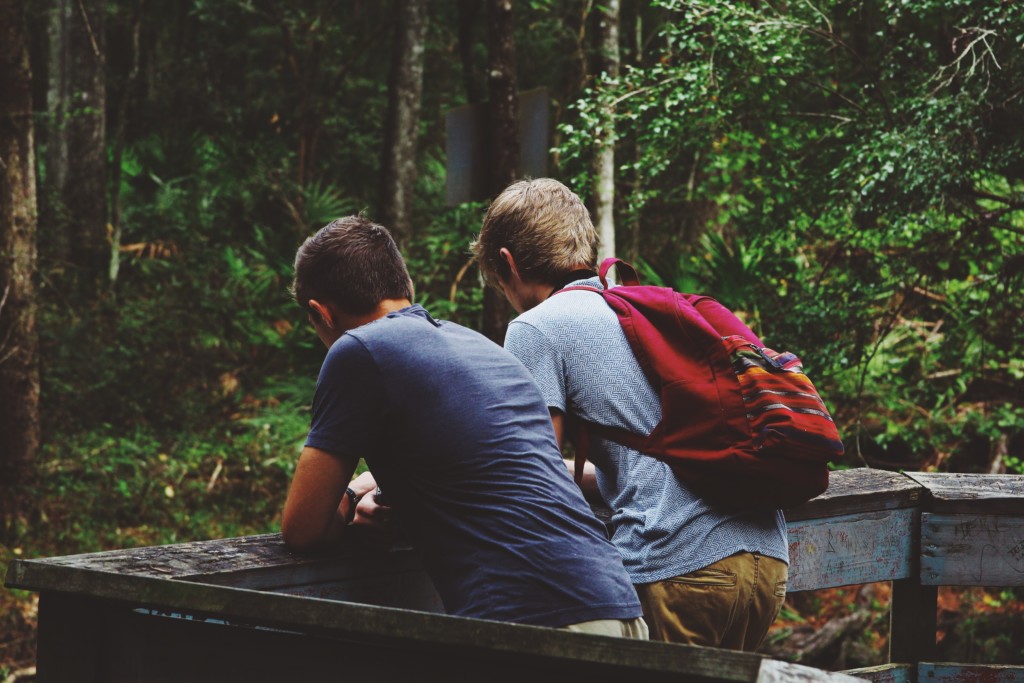Often, when we hear battle stories from other parents, we think to ourselves, "Oh, my kid would never..!" Yet our kids easily fall prey to any number of issues, struggles, and problems. Statistics show that the average age for a boy to see porn is 11. Once they view it, it is often impossible for them to get it out of their head. This can lead to deeper problems down the road. Studies show that a staggering number of people in the United States visit porn websites daily. It has become a billion dollar industry, crippling many people and destroying their lives and families.
As a parent, we want what is best for our kids. We try to protect them when they are little from the realities of the world. We want to keep them innocent as long as possible. However, the reality is that in today's world, full of technological advancements, they are thrown into the abyss often before we can prepare them for the dangers they may encounter. I wanted to avoid "the sex talk." I kept telling myself that I would do it soon, not really prepared to face the fact that my children were old enough to talk about these things. However, when my kids were 10 and 11, I bit the bullet and we had weekend getaways to go over all they needed to know as they prepared to launch into the years of puberty. But it was too late.
During these pre-teen years, I have to confess that I was distracted. I was not being pro-active or vigilant enough, and because of this, my oldest son probably felt I was unapproachable. On his own, out of curiosity, he decided to look up some of his questions online. This led him down a slippery slope to pornography. You do not know how I long to go back to those pre-teen days, so I could get a re-do and make sure I put safeguards in place to protect him.
Often, I grieve that he has to deal with this pornography addiction, and as a young man in today's society, it can be very difficult to overcome. As a woman, it is challenging for me to fully understand his struggles in this area. I do believe that many people are susceptible to addiction in different forms. For some it may be alcohol, drugs, shopping, food, OCD tendencies... you get the idea. With this in mind, I try to have a more loving approach to his addiction, instead of being judgmental. I mean the thought has crossed my mind: "Why can't you just stop?!" He has been in counseling for the past 6 months, and now I see that "just stopping" is very challenging and requires tools to be put in place daily for accountability.
Over the past several months, I have also been investigating if there are other factors in his life that have not been addressed. He probably has some sensory issues, perfectionism, and anger, which can make him more prone to struggling with addiction. Another cause could be family dynamics, or our failure to address conflict in our family. In order to avoid addressing his feelings head on, he instead resorts to feeding his mind with distraction, in his case pornography, in order to cope with the negative feelings that his emotions produce.
If you are dealing with something similar:
- There MUST be open and safe lines of communication that are established before the preteen years. Waiting to address these issues until they present themselves can be detrimental to your teen and your relationship. From what he has told me, he didn't feel safe or comfortable coming to me with his questions when he was younger. Create an open dialog when they are younger, as young as 6 or 7, so they will continue to come to YOU with questions.
- Try to understand and see things from their perspective, even if you don't agree or have negative emotions about the issue.
- Many times, it is important to seek out advice and help from professionals. Don't be afraid to reach out. It takes a village...
- Putting safeguards and accountability in place is vital for future success. It is not being a mean parent; if you love them, you have to do the hard things, even if they don't like it or become angry and defensive. My job is to be my son's mom, not his best friend.
- Install NETNanny on all computers and phones at the times. I also set the parental controls on his iPhone to very little access. Our house rule is that his phone is turned in by 10 pm and put in my room to charge, and some days I don't let him have his phone until after lunchtime (we homeschool so it is different in our home with access and free time).
- They need others in their corner to come alongside and help. They can't be set free on their own. For my son, he has found several guys at our church that he texts with regularly, and some that meet with him in person. Those healthy, male relationships have gone a long way in helping him through some really tough days.
- Being honest and open about the problem allows healing to take place; things in secret just fester and become worse.
- Ask questions! Be available to them when and where they want to talk, even if its not convenient for you. We have had many late night talks when all I really want to do is sleep, but I realize it is worth it to listen to him share. Also, riding in the car has produced some very thought provoking conversations.

Admittedly it is hard for me to gauge if my son is making progress; however at the most recent counseling session, his counselor commented on the fact that my son's outlook is more positive. He has been able to develop a more healthy inner dialog, which helps him process things better. He is turning to pornography less often because he is learning to face his emotions and feelings. He now has an app, Pacifica, that helps him breathe, meditate, and relax instead of turning to the perverse images for escape.
Have we arrived?! By no means. BUT making progress is what life is all about. Moving in a forward direction is all that we can hope for. I recently heard a quote that has stuck with me: "Two steps forward and one step back is still one step forward." Continuing to support him, talk through things, and love him the best I can is the only way we can move forward together with the hope that someday it will only be a memory of learned lessons and not a daily struggle just to survive.







